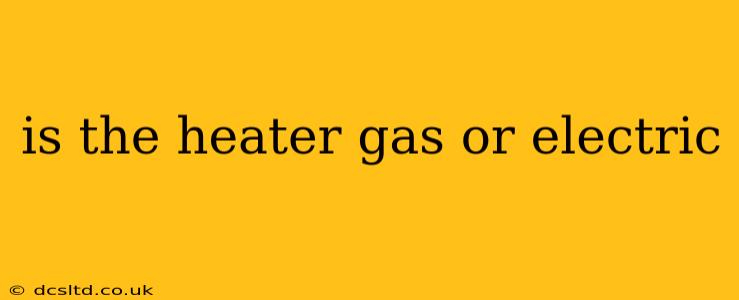Is Your Heater Gas or Electric? Understanding the Differences
Choosing between a gas and electric heater is a significant decision for homeowners, impacting both comfort and budget. This comprehensive guide will help you understand the key differences between gas and electric heaters, empowering you to make the best choice for your needs.
What are the different types of heating systems?
Home heating systems are broadly categorized into two main types: gas and electric. Within each category, you'll find various subtypes, such as forced-air furnaces (gas or electric), heat pumps (electric), radiant heating (gas or electric), and boilers (gas or oil, less commonly electric). The best system for you will depend on factors like your home's size, climate, energy costs, and budget.
What are the pros and cons of gas heaters?
Gas heaters, primarily natural gas or propane, are known for their efficiency and powerful heat output.
Pros:
- High Efficiency: Modern gas furnaces can achieve efficiency ratings exceeding 95%, meaning a significant portion of the energy used is converted into heat.
- Powerful Heating: Gas heaters provide rapid and consistent heating, particularly effective in colder climates.
- Lower Operating Costs (Potentially): Depending on your location and energy rates, gas can be cheaper than electricity, resulting in lower monthly heating bills.
Cons:
- Installation Costs: Installing a gas heater often involves more complex plumbing and venting requirements, leading to higher initial installation costs.
- Safety Concerns: Gas heaters require proper ventilation to prevent carbon monoxide buildup, necessitating regular maintenance and safety checks.
- Fuel Dependence: You are reliant on a continuous supply of gas, which can be affected by price fluctuations and potential supply disruptions.
What are the pros and cons of electric heaters?
Electric heaters offer a cleaner and often more convenient heating solution.
Pros:
- Clean Energy: Electric heaters produce no combustion byproducts, making them environmentally friendly and safer in terms of air quality.
- Easy Installation: Electric heaters are generally simpler to install, often requiring only electrical connections.
- Lower Initial Cost: The initial purchase and installation costs are typically lower compared to gas heaters.
- Precise Temperature Control: Many electric heaters offer excellent temperature control, allowing for precise adjustments.
Cons:
- Higher Operating Costs (Potentially): Electricity is often more expensive than gas, especially in regions with high electricity prices.
- Less Powerful Heating (Potentially): Electric heaters may not provide the same level of intense heat as gas systems, particularly in larger homes or extremely cold climates.
- Increased Electricity Demand: Using electric heating can significantly increase your electricity consumption during peak winter months.
How much does it cost to install a gas vs. electric heater?
Installation costs vary significantly based on location, the type of heater, the size of your home, and any necessary modifications to your existing infrastructure. Gas heater installations generally cost more due to the plumbing and venting requirements. Getting multiple quotes from qualified installers is crucial to understand the cost implications.
How do I know what type of heater I have?
The easiest way to determine if your heater is gas or electric is to visually inspect the unit. Gas heaters will typically have a gas meter connection and a vent pipe for exhaust. Electric heaters will have electrical wiring and lack a gas connection or vent pipe. Your utility bills might also provide clues, indicating gas or electricity usage for heating. If you are unsure, consulting a qualified HVAC technician is recommended.
What is the most energy-efficient heater?
Energy efficiency depends on several factors, including the type of heater, its efficiency rating, and how well your home is insulated. High-efficiency gas furnaces and heat pumps (electric) are generally considered the most energy-efficient options. However, the best choice will always depend on your specific circumstances and local energy costs.
By carefully considering the pros and cons of each type of heater and addressing your specific needs and circumstances, you can make an informed decision that optimizes your home's comfort and energy efficiency. Remember to consult with a qualified HVAC professional for personalized advice tailored to your home and local climate.
